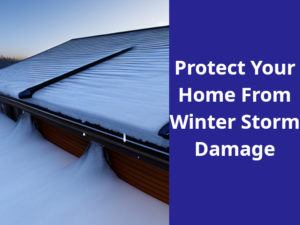Protect Your Home From Winter Storm Damage
Wintry weather is one of the most common causes of roof damage, interior damage, and plumbing damage during the winter season. Keep reading to learn how to keep your home safe this winter.
 To minimize the potential damage caused by winter weather, it is important to take proactive measures to maintain your property. Snow and ice accumulation can pose significant risks, such as tree limbs falling onto houses or power lines, as well as causing unseen structural damage and even roof collapse.
To minimize the potential damage caused by winter weather, it is important to take proactive measures to maintain your property. Snow and ice accumulation can pose significant risks, such as tree limbs falling onto houses or power lines, as well as causing unseen structural damage and even roof collapse.
Another concern is the formation of ice dams, which can lead to interior water damage. These dams occur when heavy snow melts and refreezes due to inadequate attic insulation. The ice then seeps under the shingles, melting further due to warm attic air and causing water damage inside the home.
In addition to snow and ice, freezing temperatures can also cause problems, particularly with pipes. Both interior and exterior pipes, including irrigation lines and garden hoses, are at risk of freezing and breaking. Even in typically warm areas, interior pipes may not be well insulated enough to withstand rare below freezing temperatures.
To protect your home, there are several steps you can take. Pruning trees and clearing gutters are important tasks. Removing dead, dying, diseased, or broken branches will reduce the risk of them falling during winter storms. Clearing debris from gutters will help prevent ice dams by allowing meltwater to drain freely. It is essential to use a safe and secure ladder or seek professional assistance when performing these tasks.
Evaluating the insulation and ventilation in your attic is also crucial. Proper insulation and ventilation will keep warm air inside your home and prevent it from reaching the attic. This helps minimize the freeze/thaw cycle that leads to ice dams. Additionally, it will save energy and reduce heating and air conditioning costs. Installing roof and soffit vents can provide the necessary ventilation and insulation to prevent ice dams.
Lastly, protecting your pipes is essential. Detach garden hoses from your home before freezing weather begins and properly winterize your home and irrigation systems. Leaving a faucet running at a slow drip can also help prevent pipes from freezing and cracking.
By following these measures, you can significantly reduce the risk of damage to your property during winter weather conditions.
